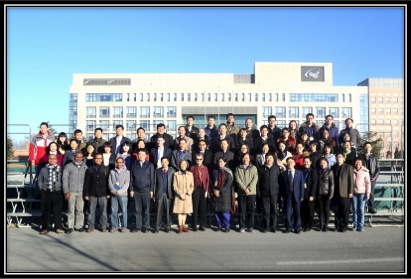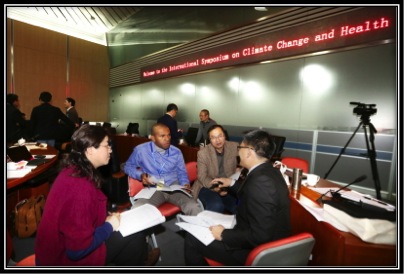I was very lucky to witness that a cold weather of Beijing did not put any burden for the 56 participants from 11 different countries to attend a 3-day regional workshop and international symposium to share ‘stories’ about health vulnerability and adaptation to climate change from their specific countries. This workshop was successfully organized by Shandong University Climate change and Health Center and Center for Environment and Population Health (CEPH) Griffith University, co-hosted by the National Institute for Communicable Disease Control and Prevention, China CDC, and financially supported by the Australian Government through Public Sector Linkage Grant and the National Basic Research Program of China through 973 program.
[caption id="attachment_314934" align="aligncenter" width="429" caption="Climate change and health international workshop at China CDC Headquarter, Beijing (Photo by China CDC)"][/caption]
While giving the welcoming remarks to the participants, Prof Cordia Chu, the Director of CEPH-Griffith University, raised the concern about the importance of international partnership development to share commitment and strategies to help global communities adapt to the changes of environment associated with climate change. She noted that, “given that climate change has put more risks to the global health issues potential partners should be identified from the Asia Pacific Region for sharing data, methodologies, and a research map towards development of adaptation strategies to climate change”.
During the international symposium, the first day, Kristie Ebi, the climate-adapt LLC, highlighted that interdisciplinary approach is a fundamental for creating climate risk scenarios. “The scientific community is now developing new integrated global, regional, and sectoral scenarios to facilitate interdisciplinary research and assessment to explore the range possible future climates and related physical changes”, said Kristie while presenting her keynote presentation.
[caption id="attachment_314935" align="aligncenter" width="411" caption="A group photo after the opening ceremony (Photo by China CDC)"]

Professor Liu Qiyong, the director of National Institute for Communicable Disease Control and Prevention shared the story about their experience in finding the implications of climate change on vector borne diseases in China. He suggested that though most of the determinant factors of vector borne diseases are related to anthropogenic, but changes in climate variability might has potential to modify the distribution of this disease. “A closely positive association between temperature indices and malaria transmission was observed in a number of studies” said Prof. Qiyong. He further added, “High relative humidity is expected to prolong the life of mosquito which enabling it to transmit the infection to several people”.
Professor Wenjun Ma, the director of Guangdong Institute of Public Health, presented their experience in finding that increase of temperature is associated with increase of mortality in Guangdong Province. He also noted that the most vulnerable groups in relation to increase of temperature are elderly, female, and also those people with existing respiratory illness. Similar to Prof Ma, Bai Li from China CDC also found that changes in temperature might affect the mortality and morbidity in Tibet. She noted, “Exposure to both hot and cold temperatures resulted in increased deaths and admission to hospital. Initiatives should be taken to reduce the adverse effects of temperature extreme events in Tibet.
In addition to this, Joacim Rocklov from Umea University, Sweden, highlighted the importance of development of early warning system for climate sensitive diseases, like dengue. He noted, “A climate-based dengue early warning provides an avenue that allows timely mitigation and enhances the effectiveness of control measures”.
[caption id="attachment_314937" align="aligncenter" width="404" caption="Some groups for indepth-discussion were formed based on type of hazard"]

Following the international symposium, there was a workshop where all representatives from different country origins presented the current progress on these countries included the Philippines, Mongolia, Bangladesh, Vietnam, Thailand, China and Indonesia. There was also a group discussion where participants were grouped by different kind of climate related hazard such as heat wave, flood, vector-borne diseases, and cyclone. These 4 hazards were considered as the 4 most popular issues among the country participants.
This workshop was able to strengthen the network platform among country participants for developing international knowledge sharing in climate change adaptation. In the last day of the workshop, there were four issues identified as the common gaps for health vulnerabilities and assessment in the context of climate change. These were including: (1) multi-stakeholder partnership in developing climate change vulnerability mapping and plan, (2) research on climate change risks and health issues, (3) translating national guidelines and research findings into local level, and (4) data availability for comprehensive risk mapping.
The workshop was closed by the statement of commitment of each country participants to work together for a better future development of climate change adaptation on health sector. International partnership among the countries particularly through sharing of information and knowledge will play an important role to support each country to develop their roadmap on health adaptation in the context of climate change. As a wise man said “the mother nature is tough, but together we are stronger” (END-Febi).
Follow Instagram @kompasianacom juga Tiktok @kompasiana biar nggak ketinggalan event seru komunitas dan tips dapat cuan dari Kompasiana. Baca juga cerita inspiratif langsung dari smartphone kamu dengan bergabung di WhatsApp Channel Kompasiana di SINI









